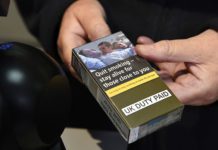Many will be watching with interest as the World Trade Organisation delivers its opinion on Australia’s plain packaging laws for tobacco products this year. The decision is due in May, just as the UK’s own ‘plain packaging’ law for tobacco products is extended.

What is plain packaging?
In reality, ‘plain packaging’ is anything but plain. Plain packaging laws prevent tobacco companies using logos, brand imagery, colours and promotional text on product packaging. Instead, all tobacco companies must follow standard guidelines set out in legislation. The only distinguishing feature between one brand and another is the brand and product name. However, these must appear in a standard colour, position, font style and size. The rest of the packaging is typically taken up with warnings about the health risks of smoking and graphic pictures of the damage caused by smoking.
Have plain packaging laws been brought into force in the UK?
Australia was the first country to introduce plain packaging in 2011, but it has since been introduced in many other countries, including the UK, where the Standardised Packaging of Tobacco Products Regulations 2015 came into effect last year. The regulations were unsuccessfully challenged in court by a number of tobacco companies. From 21 May 2017, tobacco companies will no longer be able to use any branding on tobacco products other than the brand name in a standard font and size. Shopkeepers who sell cigarettes will also be prevented from selling branded products from that date.
How will Scottish retailers be affected?
From 21 May 2017, it will be a criminal offence to supply tobacco products in non-standardised packaging. The penalties will be a fine or a prison term. There is a defence if the person neither knew nor had reasonable grounds for suspecting that the tobacco product was supplied in breach of the regulations, but retailers should ensure that they are familiar with the new restrictions on packaging so as to avoid a potentially very costly and worrying court case. In addition, if the tobacco industry’s predictions of increasing numbers of counterfeits comes to pass, shopkeepers may also be at increased risk of inadvertently supplying counterfeits. The sale of counterfeit tobacco products is also a criminal offence with penalties including a fine, forfeiture of the counterfeit goods, and even imprisonment in the most serious cases. A recent case in England saw a shopkeeper receiving a jail sentence for stocking and selling counterfeit cigarettes. Retailers should therefore ensure they take steps to avoid becoming involved in the supply of counterfeits, including ensuring that products are obtained from legitimate sources on whom they have carried out due diligence.
What are the arguments against plain packaging?
Tobacco companies argue that plain packaging deprives brand owners of valuable intellectual property rights. Companies spend millions of pounds and many years developing goodwill in their branding: If they are prevented from using it, this deprives them of the valuable property rights they have built up, and leaves their trade marks vulnerable to revocation for non-use. They also argue that plain packaging makes counterfeiting much easier because packaging is massively simplified and easier to copy.
What’s next?
The WTO’s decision, due in May, on whether plain packaging laws breach the WTO Agreement on Trade Related Aspects of Intellectual Property Rights (TRIPS Agreement), is eagerly awaited by governments and tobacco companies alike. But even when the decision is handed down, the issue will be far from settled as all parties will be entitled to a round of appeals. Nonetheless, the ruling will be of interest to not just those in the tobacco industry, but also to other industries facing scrutiny from a public health perspective. Consumer groups have suggested a decision to uphold the enforcement of tobacco plain packaging laws could pave the way for plain packaging for alcohol and foods high in sugar and fat. Such moves would likely be very hotly contested.
n Do you have a business, property or legal question or issue that you would like to know more about? Call Scottish Grocer and we’ll put it to an expert.
Contact John McNee 0141 567 6032 or john.mcnee@peeblesmedia.com
















